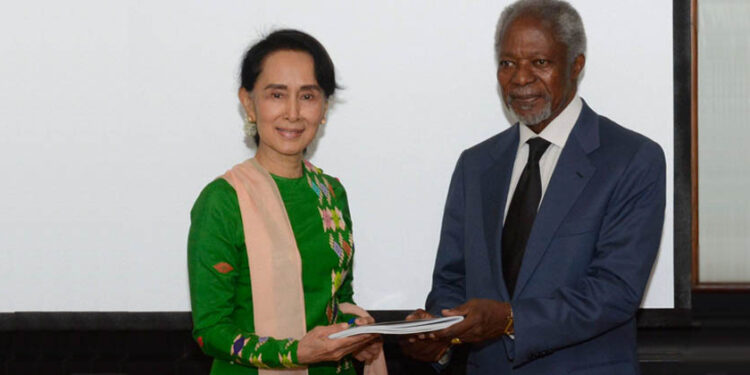YANGON — The Myanmar government said it would implement the recommendations from the Rakhine State Advisory Commission’s final report “within the shortest timeframe possible.”
The commission, led by former UN chief Kofi Annan, released its final report on Thursday at the end of it year-long mandate to advise the Myanmar government on long-term solutions for the ethnically and religious divided region.
Within hours of State Counselor Daw Aung San Suu Kyi’s meeting with the commission, the State Counselor’s Office released a statement that read: “As an immediate step, the government will form a new Ministerial-led committee responsible for the implementation of the commission’s recommendations.”
Representatives from respective government ministries will be included in the new committee, which will oversee the delivery and regular reporting on the progress of the implementation.
The committee will be assisted by an Advisory Board on Rakhine, it stated, adding that the board will include regional and international experts.
“We hope to set out a full roadmap for implementation in the coming weeks,” it added.
The government stated that “meaningful and long-term solutions are welcome” for Rakhine State, adding that the difficulties cannot be resolved overnight.
Meanwhile, Myanmar Army Chief Snr-Gen Min Aung Hlaing claimed that the commission’s report included some factual inaccuracies and questioned its impartiality, during the meeting with the commission on Thursday.
The commission criticized several aspects of Myanmar’s 1982 Citizenship Law as failing to meet international standards, pointing out that it contradicts the principles of non-discrimination under international law and treaties signed by Myanmar, as well as recently-approved domestic laws, including the military-drafted 2008 Constitution.
It urged the acceleration of the national verification process in line with the 1982 Citizenship Law in Rakhine State and the creation of a transparent strategy and timeline for granting citizenship to those eligible.
The State Counselor’s Office statement said a number of recommendations made in the advisory commission’s interim report in March had already been implemented including improved healthcare access through new mobile clinics, electrification expansion, new roads and bridges, a strategy and timeline to move forward with the National Verification Process, as well as a strategy to close internally displaced persons (IDP) camps in Rakhine State.
Three IDP camps have been closed and new houses are being built near the IDP camps, the statement stated. Training and capacity building for police and security forces in the areas of human rights, child protection and gender-based violence are being provided in cooperation with the EU and UN bodies.
After the commission’s final report was publicly released, Muslim militants launched a series of attacks on 30 police stations and outposts in northern Rakhine state beginning on Thursday night.
As of Friday afternoon, 10 police officers, one soldier and one immigration officer had been killed, and security forces killed 59 and arrested one during the attacks, according to the State Counselor’s Office Information Team.
It is the largest attack following an assault on border guard posts in October 2016.

















